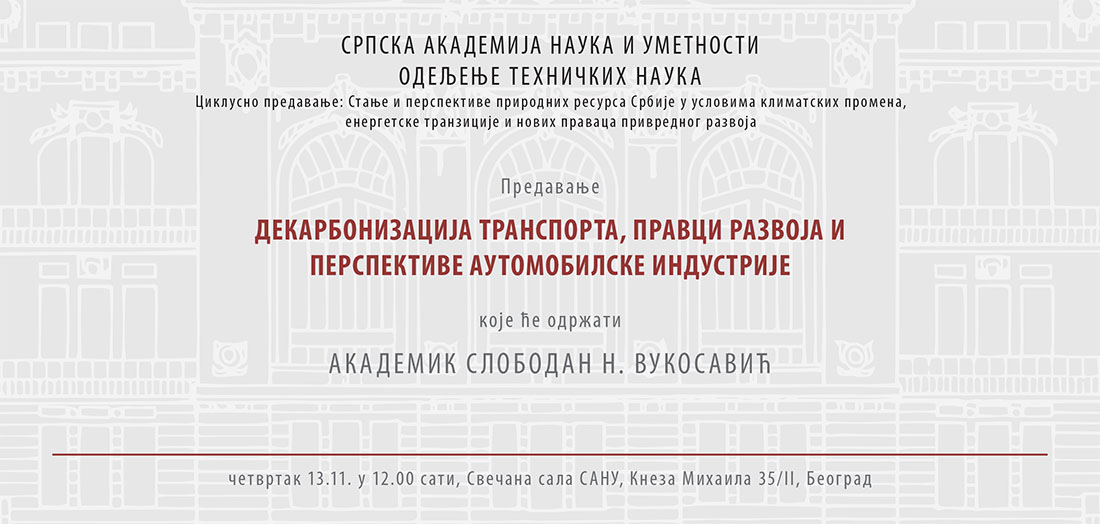Decarbonisation of Transport, Development Trends and Car Industry Perspectives
As part of the lecture series ’Current State and Perspectives of Natural Resources of Serbia in the Era of Climate Change, Energy Transition and New Directions of Economic Development’, Academician Slobodan Vukosavić gave a lecture titled ’Decarbonisation of Transport, Development Trends and Car Industry Perspectives’ on Thursday, 13 November, at the SASA Grand Hall.
The energy transition aims to replace fossil fuels, protect the environment, reduce CO2 emissions and curb climate change. Practical steps include the use of electric vehicles, the development of energy storage facilities, as well as a significantly greater share of solar and wind power energy in energy production. The aforementioned steps require larger quantities of critical minerals, which are scarce in the lithosphere. Obtaining critical minerals by means of extraction and ore processing necessitates substantial amounts of energy and serious depletion of fossil fuels. Profitable and engineer-wise rational methods for ore mining and processing of concentrated amounts create unacceptable harm to people and nature. A part of the essential materials can be obtained through recycling. However, in most cases, critical minerals recycling is intertwined with serious logistical, energy and ecological challenges.
The enclosed preliminary analysis draws on engineering experiences and data of the necessary amount of critical minerals for the production of electric vehicles, solar and wind power plants and energy storage facilities. Based on the 2050 energy transition plan and review of the necessary equipment, components and systems which are to be produced by that time, an assessment was conducted of the amount of critical minerals required for such an undertaking. The results have shown that the necessary amounts exceed global reserves, and in some cases even the available resources. Escalating problems in the acquisition of critical minerals further impede the implementation of the green agenda. In addition to the People’s Republic of China’s dominant position in the ore extraction and processing, there is a growing opposition in third-world countries toward low-cost and ecologically harmful mining. Resulting resistance, riots and armed conflicts threaten the stability and reliability of supply chains. The described state of affairs is one of the factors that hinder decarbonisation and interfere with the achievement of set targets.
According to available data, the annual increase in the consumption of energy derived from fossil fuels is several times higher than that of the energy derived from renewable resources, while the measured rise in the global average temperature questions the overall effects of decarbonisation. Among the reasons leading to unfavourable outcomes, there is an established practice of steering technological development according to the profit interests of big capital. Such interests typically take into account short-term goals and overlook the long-term effects of changes in the energy industry. Reliance on financial aspects is often accompanied by neglect of physical laws and limitations related to resources, as highlighted by the analysis. Based on the analysis of the situation and scientifically grounded findings, an overview of sustainable development directions for the car industry is provided, along with feasible energy transition solutions.

